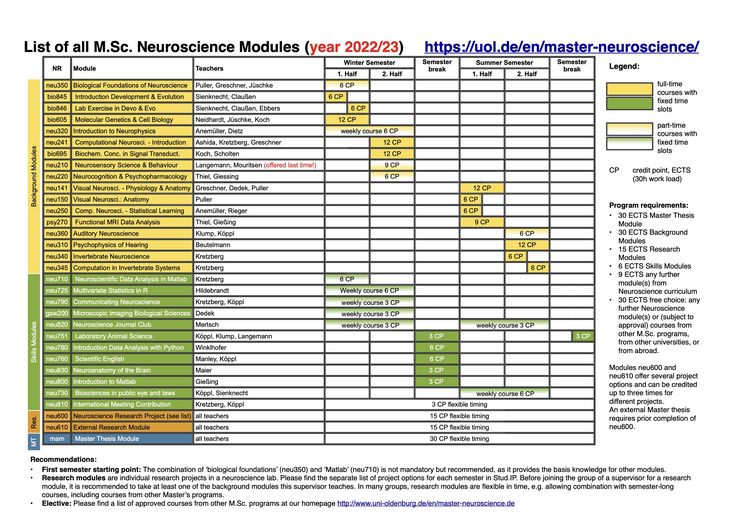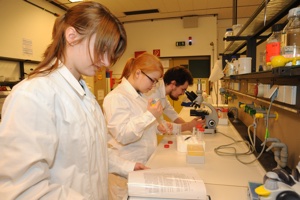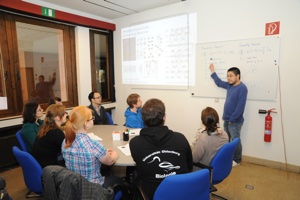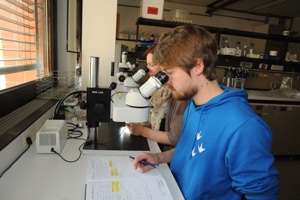Contact
Information requests about the program:
General questions regarding studies in Oldenburg:
Orientation week and Welcome (Downloads)
Module Types

Module Overview 2022/2023
You can choose from a variety of different modules to customize and design your individual curriculum. They all belong to one of these three categories: Background Modules (yellow), Skill Modules (green), or Research Modules (orange).
Please note that the list of modules can change from year to year.
Your curriculum needs to comprise 30 ECTS background modules, a 15 ECTS research module, 6 ECTS skills modules, 30 ECTS master thesis and at least 9 ECTS additional credit points from the neuroscience curriculum. Up to 30 ECTS can come from related master's programs.
Background Modules
Provide background knowledge on a neuroscientific topic. Courses for 8-20 students are organized in full-time blocks of 2-7 weeks and usually consist of lecture, seminar and hands-on practical parts.

List of M.Sc. Neuroscience Background Modules
List of M.Sc. Neuroscience Background Modules 2021/2022:
- Biological Foundations of Neuroscience (6 ECTS)
- Introduction Development & Evolution (6 ECTS)
- Lab Exercises in Development and Evolution (6 ECTS)
- Molecular Genetics and Cell Biology (12 ECTS)
- Introduction to Neurophysics (6 ECTS)
- Computational Neuroscience - Introduction (12 ECTS)
- Biochemical concepts in signal transduction (12 ECTS)
- Neurosensory Science and Behaviour (9 ECTS)
- Neurocognition & Psychopharmacology (6 ECTS)
- Visual Neuroscience - Physiology & Anatomy (12 ECTS)
- Visual Neuroscience - Anatomy (6 ECTS)
- Computational Neuroscience – Statistical Learning (6 ECTS)
- Auditory Neuroscience (6 ECTS)
- Psychophysics of Hearing (12 ECTS)
- Functional MRI data analysis (9 ECTS)
- Invertebrate Neuroscience (6 ECTS)
- Neural Computation in Intervetrates (6 ECTS)
Skills Modules
Professional skills are developed in courses for up to 25 students.

List of M.Sc. Neuroscience Skills Modules
List of M.Sc. Neuroscience Skills Modules
- Neuroscientific Data Analysis in Matlab (6 ECTS)
- Communicating Neuroscience (3 ECTS)
- Laboratory Animal Science (6 ECTS)
- Introduction to Data Analysis with Python (6 ECTS)
- Scientific English (6 ECTS)
- Biosciences in the public eye and in our laws (6 ECTS)
- Introduction to Matlab (3 ECTS)
- International Meeting Contribution (3 ECTS)
- Multivariate Statistics and Applications in R (6 ECTS)
- Neuroscience Journal Club (3 ECTS)
- Microscopic Imaging in Biomedical Sciences (3 ECTS)
- Neuroanatomy of the brain (3 ECTS)
Research Modules
Are individual student research projects (each 15 ECTS) in the supervisor’s lab. The aim is to practice independent research, including experiments, background literature and presentation of results. Lab time lasts 6-8 weeks.
It is mandatory to do at least one research module, either 'neu600' at university of Oldenburg, or 'neu610' as external research module. You can take neu600 or neu610 up to three times, if you choose project options offered by different teachers.

List of M.Sc. Neuroscience Research Projects
Module "neu600" at University of Oldenburg
List of M.Sc. Neuroscience Research Projects: Please check Stud.IP for an up-to-date list!
Here is the list of the year 2021/22
- Navigation mechanisms in nocturnal bird migration
- Ophthalmology – Molecular and cellular mechanisms in regenerative Medicine
- Human Genetics - Exploration of rare monogenic brain malformations in children using high-throughput and classical sequencing techniques
- Human Genetics - Developing therapies to treat splice defect
- Human Genetics - Mutation identification, pathogenic mechanisms and therapy development
- Human Genetics - Severe diseases of the cilium: signal transduction and treatment options
- Human Genetics - Transcriptome and Exome analyses in neuronal and neurosensory diseases
- Animal Physiology & Behaviour: Auditory perception studies
- Animal Physiology & Behaviour: Modeling the auditory system
- Biochemistry: Protein function in neurosensory systems
- Cochlea and auditory brainstem physiology: Evolutionary auditory neuroscience
- Cochlear and auditory brainstem physiology: Developmental neurobiology and evolution
- Computational Neuroscience: Invertebrate somatosensory system
- Computational Neuroscience: Modeling & data analysis
- Neurogenetics - Structure-function analyses of the potassium chloride cotransporter KCC2
- Neurogenetics - Evolution of the auditory system
- Neurogenetics - Analysis of mouse models for deafness
- Visual neuroscience – Retinal Anatomy
- Visual neuroscience - physiology / data analysis
- Visual neuroscience - Molecular mechanisms and cellular networks involved in signal transduction in the vertebrate retina
- Visual neuroscience - Molecular and cellular basis of regeneration in the peripheral nervous system
- Neurosensorics - Vertebrate retina: Immunohistochemistry, intracellular dye injections, microscopy and image analysis
- Anatomy - Molecular and cellular mechanisms of neuronal differentiation
- Anatomy - Molecular pathophysiology and therapeutic applications in rare genetic diseases
- Computational Audition - Statistical data analysis
- Neurocognition and functional neurorehabilitation
- Linguistics in Dept. of Dutch - Psycholinguistics
External Research Module
"neu610"
The External Research Module is carried out under the guidance and supervision of an experienced researcher who is not part of the regular Neuroscience faculty at the University of Oldenburg. It comprises approximately 7 (minimum 5) weeks of experimental or theoretical work, individually or in small groups, and, usually, participation in a regular group seminar during that time. After completion of the lab work, students will continue to be advised during the writing phase of the project report by the external supervisor and / or by a local Neuroscience faculty member.
In the external research project, students are introduced to independent research by performing an individual research project in a specific area of neuroscience by a scientifically working group outside of the regular MSc Neuroscience faculty at the University of Oldenburg (usually a university, research institute, clinics or scientifically working company in Germany or abroad).
The timing of projects is by individual arrangement with the supervisor.
Learning goals:
- planning and organization of a research project outside of University of Oldenburg
- teamwork in a research group
- formulate a scientific hypothesis
- planning, performing and analyzing experiments and / or simulations
- working with scientific background literature on the specific context of the project
- oral presentation and discussion of backgrounds and results in the lab seminar
- write a scientific report
- optional: Prepare and present a scientific poster
Formal requirements:
- Formal supervision / examination: All teachers from the list of MSc Neuroscience examiners at the University of Oldenburg can act as examiners.
- External supervision: According to the current examination regulations, the external supervisor is NOT allowed to give the grade for the project.
- Learning agreement: Prior to the start of the external research project, the learning agreement form needs to be signed by the student, a member of the list of examiners and the external supervisor and submitted to the examination office. (Aproval of the examination committee is not necessary for external research modules.)
- Project-specific requirements: Depending on project choice, please ask the supervisor from Oldenburg and the external supervisor for additional requirements.
Elective
30 ECTS (one semester) can be chosen from:
All courses of the M.Sc. Neuroscience curriculum or
Modules from related Master programs
MSc Neuroscience offers the opportunity to transfer up to 30 ECTS modules from other Master programs, that are related to neuroscience.
If you want to take a module from a different MSc program, you have to ask the module responsible teacher for permission! There is no guarantee for getting admission to the courses on this list. You can only take them if space allows.
Credits and grades from the following MSc modules / programs are generally accepted:
- ALL modules from the study program MSc Neurosciences at University of Bremen, except for 'Introductory Week' and 'Master Thesis'
- ALL modules from MSc Neurocognitive Psychology except for ‚Minor‘, ‚Master Thesis‘, ,Master Colloquium‘, und modules psy181, psy220, psy270, und psy276 (which are identical or overlapping with neu220, neu250, neu300 und neu305)
- ALL modules from MSc Molecular Biomedicine except for bio605, bio695, neu150, neu141, neu760, neu751 (which are shared modules with MSc Neuroscience) and the master thesis.
- ALL modules from MSc Physics, Engineering and Medicine, except for ‚Master Thesis‘, ‚phy247‘ und ‚phy734‘ (identical to neu320).
- ALL modules from MSc Hearing Technology and Audiology, except for ‚Master Thesis‘ and ‚phy870‘.
- Accepted modules from MSc Biology (which are not identical to neuroscience modules):
- bio655 Ornithology
- bio720 Marine Biodiversity
- bio733 Evolutionary Biology Populatin Genetics
- bio736 Evolutionary Transcriptomics
- bio900 Biology Research Module (for teachers who do not offer options in neu600 Neuroscience research module).
- Accepted modules from MSc Computing Science:
- inf305 Medical Technology
- inf535/536 Computational Intelligence I / II
- inf533 / 534 Probabilistic Modelling I / II
- inf588 Special Topics in 'Medical Informatics''
- Accepted from Fachmaster FK III:
- ipb612 Writing and Journalism
If you want to take a MSc module that is not on this list (e.g. a neuroscience program at a different university in Germany or abroad) you have to get permission by Jutta Kretzberg (head of examination committee) prior to taking the course.
Language Course
A language course of up to 6 ECTS can be taken as ungraded elective module.
We recommend to our international Students to take a German course.
Alternatively, a language course can be a usefull preparation for an external research module, external master thesis or a semester abroad.




